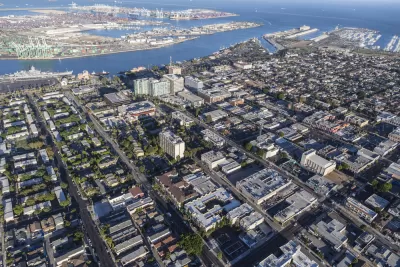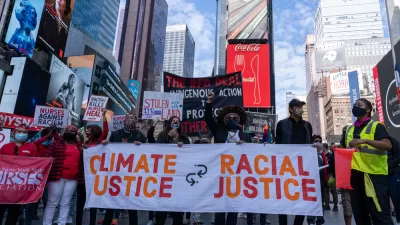The agency will administer $100 million in grants to cities, states, and tribal nations as part of the Biden administration’s Justice40 initiative.

A $100 million grant package from the Environmental Protection Agency (EPA), “the largest investment for environmental justice grants ever offered,” is aimed at helping states, cities, and tribal nations launch climate resiliency and emergency preparedness programs, particularly in underserved communities that have historically borne the brunt of pollution and the impacts of climate change.
Molly Bolan, writing in Route Fifty, describes the program’s requirements, which include partnering with a local community organization. “Special consideration will be given to projects that focus on climate change, disaster resiliency, and emergency preparedness; initiatives in rural areas; and projects that will conduct health-impact assessments, according to a release from the agency.” The grants are part of the Justice40 initiative, a White House program that pledges to direct 40 percent or more of federal climate funding to communities that have been disproportionately affected.
As Bolan explains, “In total, the EPA expects to allocate up to $1 million for 70 projects that span three years that will, among other things, conduct home audits for lead, create health education programs, and monitor water quality, according to the agency.”
FULL STORY: EPA Unveils $100 Million in Environmental Justice Grants

Maui's Vacation Rental Debate Turns Ugly
Verbal attacks, misinformation campaigns and fistfights plague a high-stakes debate to convert thousands of vacation rentals into long-term housing.

Planetizen Federal Action Tracker
A weekly monitor of how Trump’s orders and actions are impacting planners and planning in America.

San Francisco Suspends Traffic Calming Amidst Record Deaths
Citing “a challenging fiscal landscape,” the city will cease the program on the heels of 42 traffic deaths, including 24 pedestrians.

Defunct Pittsburgh Power Plant to Become Residential Tower
A decommissioned steam heat plant will be redeveloped into almost 100 affordable housing units.

Trump Prompts Restructuring of Transportation Research Board in “Unprecedented Overreach”
The TRB has eliminated more than half of its committees including those focused on climate, equity, and cities.

Amtrak Rolls Out New Orleans to Alabama “Mardi Gras” Train
The new service will operate morning and evening departures between Mobile and New Orleans.
Urban Design for Planners 1: Software Tools
This six-course series explores essential urban design concepts using open source software and equips planners with the tools they need to participate fully in the urban design process.
Planning for Universal Design
Learn the tools for implementing Universal Design in planning regulations.
Heyer Gruel & Associates PA
JM Goldson LLC
Custer County Colorado
City of Camden Redevelopment Agency
City of Astoria
Transportation Research & Education Center (TREC) at Portland State University
Jefferson Parish Government
Camden Redevelopment Agency
City of Claremont





























